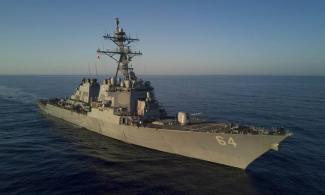
The move is part of Washington's strategy to reinforce defenses in response to growing threats from Iran and its regional allies, Hamas and Hezbollah.
The United States' Military announced on Friday that it will deploy additional fighter jets and Navy warships to the Middle East region.
The move is part of Washington's strategy to reinforce defenses in response to growing threats from Iran and its regional allies, Hamas and Hezbollah.
Reuters reports that the U.S. is preparing for Iran to follow through on its promise to retaliate for the killing of Hamas leader Ismail Haniyeh two days ago in Tehran. This event is part of a series of targeted killings of senior figures in the Palestinian militant group amid the ongoing conflict between Israel and Hamas in Gaza.
U.S. Defense Secretary Lloyd Austin has authorized the deployment of additional Navy cruisers and destroyers, which are capable of intercepting ballistic missiles, to the Middle East and Europe. Additionally, a squadron of fighter jets will be sent to the Middle East.
According to a Pentagon statement, Austin has ordered these adjustments to U.S. military posture to enhance force protection, support the defense of Israel, and ensure readiness to respond to various contingencies.
Speculation had arisen that the Pentagon might not replace the USS Theodore Roosevelt carrier strike group in the Middle East after its current deployment. However, Austin decided to rotate in the USS Abraham Lincoln Carrier strike group as a replacement. The Pentagon also announced plans to increase readiness for deploying more land-based ballistic missile defenses.
Prior to April 13, when Iran launched a drone and missile attack on Israeli territory, the U.S. military had already intensified deployments. Despite these efforts, the threat from Hezbollah in Lebanon poses unique challenges due to the group's extensive arsenal and close proximity to Israel.
During the attack, Israel, with the help of the U.S. and other allies, successfully intercepted almost all of the approximately 300 drones and missiles.
In a phone call on Thursday, President Biden and Israeli Prime Minister Netanyahu discussed new U.S. military deployments to support Israel against threats such as missiles and drones, according to the White House.
Iran and Hamas have accused Israel of carrying out the killing of Haniyeh and have vowed to retaliate. Israel has neither confirmed nor denied responsibility. Haniyeh's death is one among several targeted killings of senior Hamas figures as the war in Gaza between Hamas and Israel approaches its 11th month, raising concerns of a wider conflict in the Middle East.
Pentagon spokesperson Sabrina Singh indicated that the US does not believe escalation is inevitable, stating, "We are being very direct in our messaging that we don't want heightened tensions and we believe there is an off-ramp here, which is a ceasefire deal."